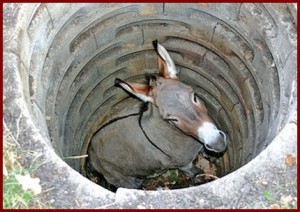There have been a variety of studies conducted in psychology examining what punishment is capable of doing; mathematical models have been constructed too. As it turns out, when you give people the option to inflict costs on others, the former group are pretty good at manipulating the behavior of the latter. The basic principle is, well, pretty basic: there are costs and benefits to acting in various fashions and, if you punish certain behaviors, you shift the plausible range of self-interested behaviors. Stealing might be profitable in some cases, unless I know that it will, say, land me jail for 5 years. Since five years in jail is a larger cost than benefit I might reap from stealing (provided I am detected, of course), the incentive to not steal is larger and people don’t do take things which aren’t theirs. The power of punishment is such that, in theory, it is capable of making people behave in pretty much any conceivable fashion so long as they are making decisions on the basis of some kind of cost/benefit calculation. All you have to do is make the alternative courses of action costlier, and you can push people towards any particular path (though if people behave irrespective of the costs and benefits, punishment is no longer effective).
Now, in most cases, the main focus of this research on punishment has been on what one might dub “normal” punishment. A case of normal punishment would involve, say, Person A defecting on Person B, followed by person B then punishing person A. So, someone behaves in an anti-social fashion and gets punished for it. This kind of punishment is great for maintaining cooperation and pointing out how altruistic people are. However, a good deal of punishment in these experiments is what one might dub “perverse”.
“Yes; quite perverse indeed…”
By perverse punishment, I am referring to instances of punishment where people are punished for giving up their own resources and benefiting others. That people are getting punished for behaving altruistically is rather interesting, as the pro-social behavior being targeted for punishment is, at least in the typical experiments, benefiting the people enacting the punishment. As we tend to punish behavior we want to see less of, and self-benefiting behavior is generally something we want more of, the punishment of others for benefiting the punisher appears to be rather strange. Now I think this strangeness can be resolved, but, before doing that, it is worthwhile to consider an experiment examining whether or not punishment is also capable of reducing perverse punishment.
The experiment – by Cinyabuguma, Page, & Putterman, (2006) – began with a voluntary contribution game. In games like these (which are also known as public goods game), a number of players start off with a certain pool of resources. In the first stage of the game, each player has the option to contribute any amount of their resources towards the public pool. The resources in this pool get multiplied by some amount and then distributed equally among all the players. The payout of these games are such that everyone could do better if they all contributed, but at the individual level contributions make one worse off. So, in other words, you make the most money when everyone else contributes the most and you contribute nothing. In the second stage of the game, the amount that each player has donated to the public good becomes known to everyone else, and each person has the option to “punish” others, which involves giving up some of your own payment to reduce someone else’s payment by 4 times the amount you paid.
The twist in this experiment is the addition of another condition. In that condition, after the first two steps (First subjects contribute and, second, subjects learn of the contributions of others and can punish them), there was then a round of second-order punishment. What this means is that, after people punished the first time, each participant got to see who punished who, and could then punish each other again. Simply put: I could punish someone for either punishing me or for punishing someone else. So the first condition allowed for the punishment of contributions alone, whereas the second allowed for both the punishment of contributions and the punishment of punishment. The question of interest is whether or not perverse punishment and/or cooperation was any different between the two.
“It’s still looking pretty perverse to me”
The answer to that question is yes, but the differences are quite slight, and often not significant. When people could only punish contributions, the average contribution was 7.09 experimental dollars (each person could contribution up to 10); when punishment of punishment was also permitted, the average contribution rose ever so slightly to in between 7.35 and 7.97 units. Similarly, earnings increased when people could punish punishment: when the second-order punishment was an option, people earned more (about 13.35 units) relative to when second-order punishment wasn’t an option (around 12.86 units). So, though these differences weren’t terribly significant, allowing for the punishment of punishers tended to increase the overall amount of money people made slightly.
Also of interest, though, is the nature of the punishment itself. In particular, there are two findings I would like to draw attention to: the first of these is that if someone received punishment for punishing others, they tended to punish less during later periods. In other words, since punishing others was itself punished, less punishment took place (though this seemed to affect the perverse punishment more so than the normal type). This is a fairly expected result.
The second finding I would like to draw attention to concerns the matter of free-riders. Free-riders are individuals who benefit from the public good, but do not themselves contribute to it. Now, in the case of this economic game we’ve been discussing, there are two types of free-riders: the first are people who don’t contribute much to the public good and, accordingly, are targeted for “normal” punishment. However, there are also second-order free-riders; I know this must be getting awfully hard to keep track of, but these second-order free-riders are people who benefit from free-riders being punished, but do not themselves punish others. To put that in simple terms, I’m better off if anti-social people are punished and if I don’t have to be the one to punish them personally. What I find interesting in these results is that these second-order free-riders were not targeted for punishment; instead, those who punished – either normally or perversely – ended up getting punished more as revenge. Predictably, then, those who failed to punish ended up with an advantage over those who did punish. Not only did they not have to spend money on punishing others, but they also weren’t the target of revenge punishment.
So what does all this tell us when it comes to helping us understand perverse punishment, and punishment more generally? Well, part of that answer comes from considering the fact that it was predominately people who were above/below the average contribution level of the group doing most of the punishing; relatedly, they were largely targeting each other. This suggests, to me, anyway, that a good deal of “perverse” punishment is a kind of preemptive defense (or, as some might call it, an offense) against one’s probably rivals. Since low contributors likely have some inkling that those who contribute a lot will preferentially target them for punishment, this “perverse” punishment could simply reflect that knowledge. Such an explanation makes the “perverse” punishment seem a bit less perverse. Instead of reflecting people punishing against their interests, perverse punishment might work in their interests to some degree. They don’t want to be punished, and they are trying to inflict costs on those who would inflict costs on them.
Which at least makes more sense than the “He’s just an asshole” hypothesis…
I think it helps to also think about what patterns of punishment were not observed to answer our question. As I mentioned initially, people’s payoffs in these games would be maximized if everyone else contributed the maximum and they personally contributed nothing. It follows, then, that one might be able to make himself better off by punishing anyone else who contributes less than the maximal amount, irrespective of how much the punisher contributed. Yet this isn’t what we see. This raises the question, then, of why average contributors don’t receive much punishment, despite them still contributing less than that highest donors. The answer to these questions no doubt lies, in part, on the fact that punishing others is costly, as previously mentioned Thinking about when punishment becomes less costly should shed light on the matter, but since this has already gone a bit long, I’ll save that speculation for when my next paper gets published.
Reference: Cinyabuguma, M., Page, T., & Putterman, L. (2006). Can second-order punishment deter perverse punishment? Experimental Economics, 9, 265-279.



